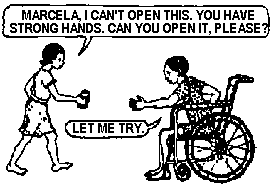Father-daughter relationships and father-son
relationships differ greatly. This is because boys and girls are innately pyscologically different. Even if sons and daughters experience similar struggles, the way
they respond are distinctive. In the two stories we read this week,
"Shooting Dad" and "Arm Wrestling with my Father", it was
apparent that both the protagonists struggled to accept their parent's ideologies. In the end both families reconciled, but each did so
differently. In “Shooting Dad” Vowell suddenly comes to the realization that
she has much in common with her father. During her youth, her and her father’s
political ideology were so opposed that parts of their home had to be
sanctioned as “DMZs” (153). As she grew up she gained interest in becoming a
“better daughter” (155). And so, she attempted to reconcile their relationship
by taking the initiative to participate in activities her father enjoyed-
anything with guns. In comparison, in “Arm Wrestling with my Father” Manning
confesses that he had to “assume” that his father loved him, because his father
never expressed it verbally (145). Their communication was solely “physical”
(145). As Manning grew older he no longer felt the need to compete. He grew
stronger as his father grew weaker. However, years later father and son
returned to the same activity. As they arm wrestled Manning realized that the
match represented a rite of passage. When he beat his father he would become
the patriarch of the family. These two
stories highlight an important difference between boys and girls. Vowell, the
female, chooses to reconcile her relationship by changing herself. On the other
had, Manning, the male, choose to overcome his struggle by taking his father’s
position. Men have the desire to prove themselves, while women will adapt to
their surroundings.
Sunday, February 23, 2014
Saturday, February 15, 2014
A Girl of Only 21
The rolling clouds have
stopped
And, the winds continuous
whistle has silenced.
A girl of only 21 stands and
stares at the scene behind her
Even on this dreary day the
sounds of the last laugh
And the whispers of the last gossip
of hang in the air.
Two young women have cleverly set
shop.
The ephemeral scents of the rose
and lilies
Titillate the emotions of the
surrounding people.
In her billowing white dress the
woman stands motionless
As she observes those around
her
The past will never come back
And the future will never arrive
For the present is eternal
Her carefully carved neck holds
her head high
She wants to cry as she witnesses
the joy of another couple
The man has just returned from
war
His pride for his country is
shown on the uniform he still wears
He stands opposite his female
friend
Not too far; but close enough to
rekindle their feelings
And the lady in the white dress-
With her craned neck-
Watches, her fleeting intrusion
in the couple's private moment
Becomes permanent. A snapshot of
time.
Her yearning is apparent; Her
slightly turned hands,
And her slightly bowed face.
Her hat covers her eyes. Those
eyes-
That if one could see- would
reveal
All the secrets of this young
girl of 21
Her heart is empty only to be
filled
By the same man who will accept
her roses
But, when will he come?
Will he ever come?
Poor child, the thorns of the
roses
Will forever prick her heart
As she waits to greet her husband
Her head will always look back
Because, for her,
There is nothing to look forward to.
Saturday, February 8, 2014
Mom, Why Can't I Sleep?
 There exists a plethora of stories telling the tales of
hardship and success of coming to a new country. Many first generation
immigrants share similar experiences, but only few are able to become
successful. In Amy Tan’s narrative “Fish Cheeks” she recounts the troubles of
being a first generation American-born immigrant. She stresses how hard it is
to be proud of her Chinese “manners” in the company of an American, especially
that of a boy she likes. Her parents confidently embrace their traditional
“customs” because it is their way of holding on to their fond memories.
However, for Amy she has no connection to China other than through her parents.
This puts her in an uncomfortable position. She does not know which culture she
truly belongs to, either the one she was born into or the one she was born
from.
There exists a plethora of stories telling the tales of
hardship and success of coming to a new country. Many first generation
immigrants share similar experiences, but only few are able to become
successful. In Amy Tan’s narrative “Fish Cheeks” she recounts the troubles of
being a first generation American-born immigrant. She stresses how hard it is
to be proud of her Chinese “manners” in the company of an American, especially
that of a boy she likes. Her parents confidently embrace their traditional
“customs” because it is their way of holding on to their fond memories.
However, for Amy she has no connection to China other than through her parents.
This puts her in an uncomfortable position. She does not know which culture she
truly belongs to, either the one she was born into or the one she was born
from. Sunday, February 2, 2014
My Perception, Your Identity
Identity and perception are not synonymous. Most
people tend to be their harshest critics. They label themselves as too skinny
or too fat; too dumb or too nerdy. Most of these self-criticisms are inaccurate and can lead to psychological and emotional consequences. In Mair's
piece "Disability", she highlights that the way people perceive
disabled people is demeaning. She, a person afflicted with Multiple Sclerosis,
states that the way others perceive her is in a very condescending manner. She
knows she walks differently, but otherwise she feels like a typical American.
The discrepancy in the perception of disabled people by society and their
self-perception underscores a societal problem. She asserts that many people
today are afflicted with disabilities, or they soon will be. These people, who
she calls “Temporarily Abled Persons”, will soon join the “majority”. She
presents this as a stage in life- something inevitable. Because of this, she
argues that we as a society should be more accepting of disabled people. This way
the disabled person does not feel isolated. Furthermore, when the abled people evenutally becomes disabled, they too will feel accepted in society. We, as a
society, must learn to perceive others the way they identify
themselves.
Subscribe to:
Comments (Atom)



